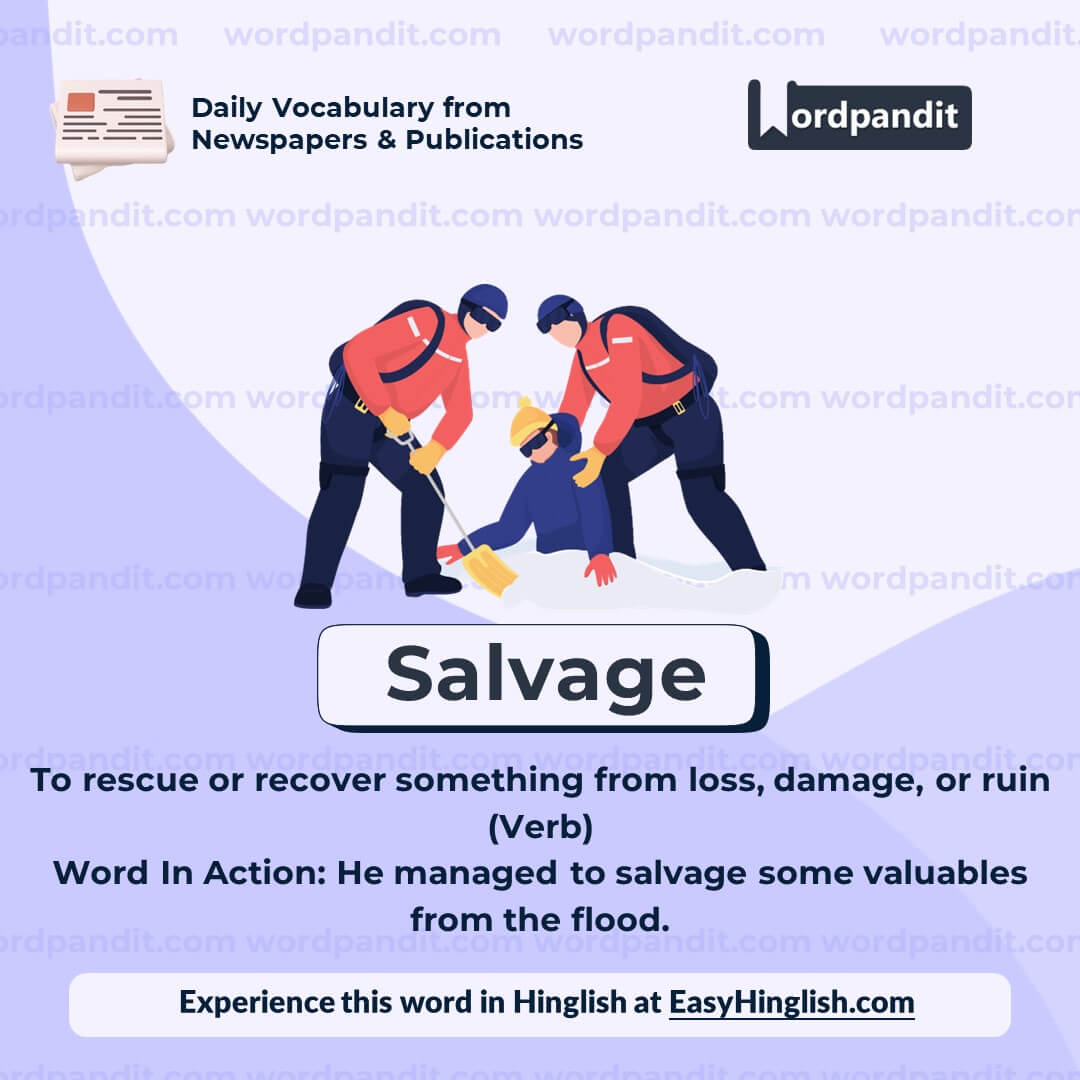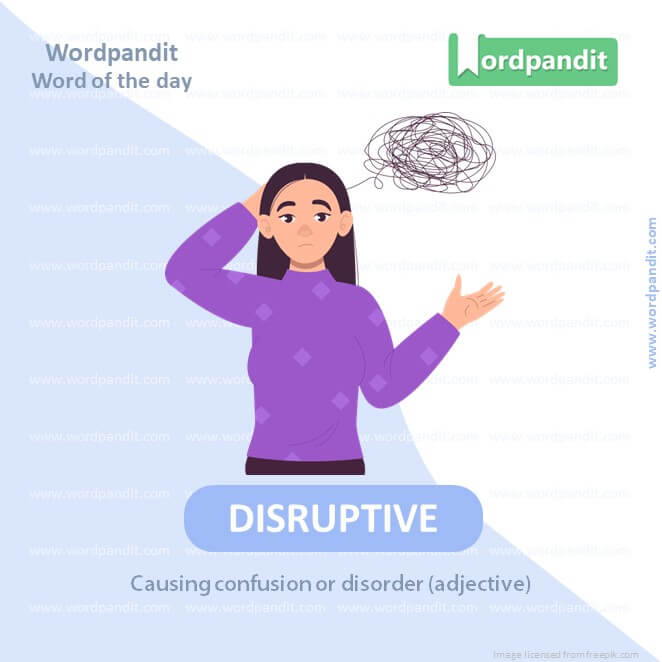Daily Vocabulary from Indian Newspapers and Publications
Welcome to Wordpandit’s Indian Vocabulary Hub
At Wordpandit, we understand the importance of staying rooted in the local context while expanding your language skills. This section focuses on enriching your vocabulary with words and phrases drawn from India’s leading newspapers and publications, ensuring you're learning vocabulary that is practical, relevant, and uniquely Indian.
Why Indian Sources Matter
We believe that the best way to master any language is by immersing yourself in local content. That’s why we carefully curate vocabulary from top Indian publications, including:
- The Hindu
- The Times of India
- The Economic Times
- Hindustan Times
- Live Mint
- The Indian Express
- And many others...
Stay Updated, Stay Relevant
With daily updates from Indian news sources, you’ll be consistently learning words that reflect the trends and shifts in Indian society and culture. Our focus is to provide vocabulary that enhances your understanding of the language in an Indian context.
How Wordpandit Supports Your Goals
Whether you’re preparing for exams, aiming to improve your professional communication, or simply want to stay connected with the latest Indian vocabulary, Wordpandit is here to guide you every step of the way.
Learn with a Practical Approach
Our interactive learning methodology includes real-world examples, engaging activities, and context-specific usage to ensure that every word becomes part of your active vocabulary.
Dive into Indian Vocabulary Today!
Why Choose Wordpandit?
Practical Learning: Focus on words you'll actually encounter in real-world reading, enhancing your comprehension and communication skills.
Diverse Content: From current affairs to scientific breakthroughs, our varied sources expose you to vocabulary across multiple domains.
Effortless Integration: Make Wordpandit a part of your daily routine. Just a few minutes each day can significantly boost your lexicon over time.
Your Path to Vocabulary Mastery
- Visit our Daily Vocabulary section regularly
- Explore new words and their usage in context
- Practice incorporating these words into your own writing and speech
- Track your progress as your vocabulary expands
Start Your Journey Today
Embark on your vocabulary enhancement journey with Wordpandit. By consistently engaging with our daily posts, you'll build a robust vocabulary that serves you well in academic, professional, and personal contexts.
Remember, a word a day keeps linguistic limitations at bay. Make Wordpandit your daily companion in the quest for vocabulary excellence!
WORD-1: Salvage
Context:
"China has let loose a salvo in response to Trump’s tariff assault. Yesterday, it announced a 34% import duty on all US goods. This reciprocal tariff is at exactly the same rate as the one Trump had imposed on imports from China, on April 2." – The Times of India
Explanatory Paragraph:
The word "salvo" originally refers to a simultaneous discharge of artillery or firearms, typically as part of a military attack. Over time, it has also come to mean a sudden or aggressive series of actions or statements, especially as an opening move in a conflict. In the context of international trade or politics, a "salvo" usually refers to a forceful and retaliatory move, like imposing tariffs or sanctions.
Meaning: A sudden, forceful attack or series of acts, especially as an opening move (Noun)
Pronunciation: SAL-voh
Difficulty Level: ⭐⭐⭐ Intermediate
Etymology: From Italian *salva*, meaning "salute" or "volley", which derives from Latin *salvare* meaning "to save or greet". Originally used in the context of ceremonial gunfire.
Prashant Sir's Notes:
This word is quite vivid. Think of it as the first big punch in a conflict, whether it's a debate, a political rivalry, or even a trade war. It's an assertive opening – dramatic and meant to provoke a reaction.
Synonyms & Antonyms:
Synonyms: barrage, onslaught, burst, volley, attack, blitz
Antonyms: retreat, truce, lull, peace offering
Usage Examples:
- The minister launched a verbal salvo against the opposition during the press conference.
- The opening salvo in the marketing campaign took competitors by surprise.
- With a salvo of trade sanctions, the country signaled it wouldn’t back down easily.
- The critic’s review was a salvo that set social media buzzing for days.
Cultural Reference:
"The opening salvo in the Cold War was not with weapons, but with words and ideology." – Paraphrased from historical analyses of post-WWII tensions.
Think About It:
Can verbal or non-physical "salvos" be more powerful than physical attacks in modern society? Why or why not?
Quick Activity:
Think of a recent political or media event. Write one sentence describing the "salvo" that began the confrontation.
Memory Tip:
Think of *Salvo* as a loud, sudden *"SALute VOLley"* — imagine cannons firing or someone launching a sharp, sudden comment. SAL + VO (Volley) = SALVO.
Real-World Application:
"Salvo" is often used in news headlines and articles related to politics, warfare, debates, or trade wars. Understanding this word helps readers grasp the aggressive or strategic nature of a statement or policy move.
WORD-2: Reciprocal
Context:
"China has let loose a salvo in response to Trump’s tariff assault. Yesterday, it announced a 34% import duty on all US goods. This reciprocal tariff is at exactly the same rate as the one Trump had imposed on imports from China, on April 2." – The Times of India
Explanatory Paragraph:
"Reciprocal" refers to something that is done in return or as a response to a similar action. In relationships, politics, or economics, it involves a give-and-take dynamic, where one action prompts an equal or corresponding reaction. In the context of international trade, a reciprocal tariff means one country imposes the same tariff rate that another country had earlier imposed – a tit-for-tat policy designed to maintain balance or fairness.
Meaning: Given or done in return; mutual or corresponding (Adjective)
Pronunciation: ri-SIP-roh-kul
Difficulty Level: ⭐⭐ Basic-Intermediate
Etymology: From Latin *reciprocus*, meaning "moving backward and forward", which evolved into the sense of mutual exchange or response.
Prashant Sir's Notes:
“Reciprocal” is a very practical word. It’s about fairness, balance, and mutual actions. Whenever two sides give and take in equal measure – whether it's respect, tariffs, or responsibilities – the relationship is reciprocal.
Synonyms & Antonyms:
Synonyms: mutual, corresponding, equivalent, matching, balanced
Antonyms: unilateral, one-sided, uneven, unequal
Usage Examples:
- Respect in any relationship should be reciprocal to build trust and harmony.
- The trade agreement includes reciprocal benefits for both nations.
- Her kindness was met with reciprocal generosity from her colleagues.
- Reciprocal tariffs often lead to prolonged trade disputes between countries.
Cultural Reference:
"Do unto others as you would have them do unto you" — this Golden Rule is rooted in the idea of reciprocal behavior. – Common Ethical Teaching
Think About It:
Can true reciprocity exist in global politics, or is it always influenced by power dynamics and self-interest?
Quick Activity:
Write a sentence using “reciprocal” in a non-political context – maybe involving friendship, teamwork, or learning.
Memory Tip:
Think of "re-cycle" and "re-turn" — both involve going back or giving back. “Reciprocal” is about returning what you get — like a mirror image or a boomerang.
Real-World Application:
Understanding the word “reciprocal” helps you follow global events, especially in diplomacy and trade. It also helps in interpersonal communication, where mutual effort and respect are essential.
WORD-3: Disruptive
Context:
"What United States President Donald Trump did to global trade on April 2, 2025 in Washington closely mirrors a disruptive precedent set by President Richard Nixon in 1971." - The Hindu
Explanatory Paragraph:
The word "disruptive" describes something that causes interruption or disturbance in the normal flow of events. It often carries a negative tone when referring to chaos or instability. However, in modern usage, especially in business or innovation, "disruptive" can have a positive connotation, referring to ideas or technologies that radically change industries by breaking old patterns and introducing new ways of doing things.
Meaning: Causing disturbance or change that interrupts the normal flow of events (Adjective)
Pronunciation: dis-RUP-tiv
Difficulty Level: ⭐⭐ Basic-Intermediate
Etymology: From Latin *disrumpere*, meaning "to break apart", from *dis-* (apart) + *rumpere* (to break).
Prashant Sir's Notes:
This word is a double-edged sword. In one context, "disruptive" may describe harmful instability, especially in politics or economics. But in tech or entrepreneurship, it's often a badge of honor — think of "disruptive innovation" that changes the game entirely. Understand both shades!
Synonyms & Antonyms:
Synonyms: unsettling, chaotic, revolutionary, turbulent, radical, disorderly
Antonyms: stable, orderly, constructive, peaceful, harmonious
Usage Examples:
- The CEO introduced a disruptive strategy that changed the face of the industry.
- The student’s disruptive behavior caused the teacher to pause the lesson.
- Electric vehicles have had a disruptive impact on the traditional automobile market.
- The sudden resignation of the finance minister was seen as a disruptive move in the midst of economic reforms.
Cultural Reference:
“Disruptive innovation” is a term popularized by Harvard professor Clayton Christensen, referring to innovations that create a new market and eventually displace established leaders.
Think About It:
Can disruption ever be completely positive, or does it always bring some degree of instability with it?
Quick Activity:
List one example of a disruptive product or idea you’ve seen in the last year. Describe how it changed things.
Memory Tip:
Think of a *rupture* or *eruption* — sudden breakage or interruption. *Disruptive* = dis + rupture = something that breaks the flow.
Real-World Application:
"Disruptive" is frequently used in business, tech, and geopolitical reporting. Knowing this word helps you better interpret headlines about market shifts, innovation, or political shake-ups.
WORD-4: Precedent
Context:
"What United States President Donald Trump did to global trade on April 2, 2025 in Washington closely mirrors a disruptive precedent set by President Richard Nixon in 1971." - The Hindu
Explanatory Paragraph:
A "precedent" is an earlier event or action that serves as an example or guide for future situations. It is especially significant in law, governance, and decision-making. When someone refers to a "precedent," they mean that a similar thing has happened before and set a kind of unofficial standard. In this context, Trump’s action is compared to a past disruptive decision by Nixon, implying it follows a similar pattern or logic already established in history.
Meaning: An earlier event or action that serves as an example or guide for future situations (Noun)
Pronunciation: PRESS-uh-dent
Difficulty Level: ⭐⭐⭐ Intermediate
Etymology: From Old French *precedent*, and from Latin *praecedentem* — "going before", from *prae-* (before) + *cedere* (to go).
Prashant Sir's Notes:
Think of a precedent as a “reference point from the past.” It’s particularly important in legal and political discussions, where decisions often follow what’s been done before — unless someone chooses to break the mold.
Synonyms & Antonyms:
Synonyms: example, model, standard, guide, benchmark
Antonyms: anomaly, outlier, deviation, exception
Usage Examples:
- The judge cited a legal precedent from 2001 to support the ruling.
- Setting a new precedent, the CEO allowed employees to work from anywhere permanently.
- The president's decision had a historical precedent that many advisors studied beforehand.
- Breaking with precedent, the athlete skipped the national anthem ceremony.
Cultural Reference:
In the legal system of the United States and many other countries, the principle of "stare decisis" means courts are bound to follow precedents set by higher courts in previous rulings — a cornerstone of common law tradition.
Think About It:
Should all precedents be followed, or is it sometimes necessary — even beneficial — to break with tradition?
Quick Activity:
Identify a precedent in your personal life — a rule, tradition, or routine you've set. Has it helped or limited you?
Memory Tip:
Think: *Pre-* means before, and *-cedent* sounds like “incident.” A *precedent* is a “before-incident” that guides what happens next.
Real-World Application:
Understanding “precedent” is vital in law, politics, business, and even daily decision-making. It helps you analyze whether current actions follow a logical history or break away from it—and what that might mean.
WORD-5: Prodigious
Context:
"The inventory of moons in our solar system went up by many notches in one go last month. A team of astronomers has announced the discovery of 128 new moons of Saturn, bringing its total count of moons to a prodigious number of 274." - The Indian Express
Explanatory Paragraph:
"Prodigious" is used to describe something extraordinary in size, amount, extent, or degree. It conveys a sense of awe or amazement due to the sheer magnitude of something. In the sentence above, the number of Saturn’s moons is called “prodigious” to emphasize just how unexpectedly vast and impressive that total is. The word often carries a tone of wonder and admiration, especially when something surpasses expectations or norms.
Meaning: Remarkably or impressively great in extent, size, or degree (Adjective)
Pronunciation: pruh-DIJ-us
Difficulty Level: ⭐⭐⭐ Intermediate
Etymology: From Latin *prodigiosus*, meaning "marvelous" or "unnatural", derived from *prodigium* — a prophetic sign or omen.
Prashant Sir's Notes:
This is a wonderful word to add grandeur or emphasis. Use it when “huge” or “big” isn’t enough. It can refer to size, achievement, intellect, or even effort — anything that’s astonishingly vast or impressive.
Synonyms & Antonyms:
Synonyms: enormous, immense, colossal, staggering, monumental, vast
Antonyms: tiny, insignificant, ordinary, small, modest
Usage Examples:
- She displayed a prodigious talent for mathematics at an early age.
- The construction of the bridge required prodigious amounts of steel and concrete.
- His memory is prodigious — he can recall facts from years ago without hesitation.
- The team made a prodigious effort to meet the impossible deadline.
Cultural Reference:
In the musical *Amadeus*, Mozart is portrayed as a musical prodigy with prodigious talent — his abilities from childhood were so impressive that they shocked even seasoned composers.
Think About It:
Can something be prodigious and still go unnoticed? What does that say about how we measure or value greatness?
Quick Activity:
Write a sentence using "prodigious" to describe a person, a place, or a scientific discovery.
Memory Tip:
Think of "prodigious" as related to a “prodigy” — someone who does something at a massive, awe-inspiring level. If a child solves college-level math, that’s prodigious!
Real-World Application:
"Prodigious" is frequently used in academic writing, journalism, and storytelling to emphasize the extraordinary. It's a powerful word when you want to show just how impressive or vast something is, from space discoveries to human achievement.



















